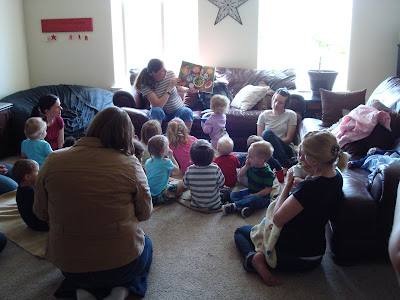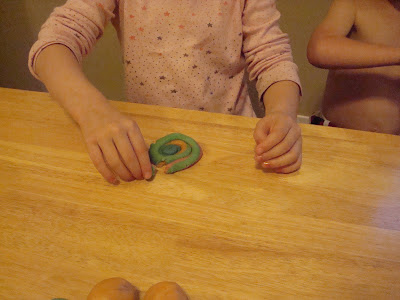This is another classic rule of parenting from my friend Marsha Lima that will greatly help with the behavior of your child.
Mean what you say
This sounds simple enough.
Until you actually start to pay attention to what you are saying, and whether or not you are acutally doing it.
When I first started paying attention to what I was saying, I noticed that I would constantly change my mind.
If Cannon would continually ask me for apple juice instead of water, I would finally give in - because it didn't seem worth it over something so tirivial.
In reality, all it taught him was that if he bugs me long enough, he'll get what he wants eventually.
Another common example would be false threats.
Something like: "if you don't finish your dinner you are going straight to bed".
Or "stop acting like that or we are going home" (my personal favorite).
How often do they NOT finish their dinner and end up NOT going to bed,
or continue to act out but dont have to go home?
Take the time to show your kids that you are serious.
Another example: letting your child simply ignore you.
One of the best things that Marsha has taught me is that
your words need to mean something.
If you are talking to your child, jokingly/lovinlgly/seriously; do it with purpose.
If they ignore you; even if they simply don't hear you, it is important to get their attention, say it again, and of course - mean what you say.
Letting your child ignore you, subconsciously or not, starts the process of them being able to "block you out".
Which of course brings up another good point: your actions have to match your words.
This is a hard one for me, and I would assume a lot of parents by what I've observed.
It is much easier to keep repeating: "don't touch that", over and over again, louder and louder, until your child finally graps the concept.
Instead, mean what you say; rather than repeating it (which again teaches them to block you out), physically help them to do whatever it is you are saying.
Marsha says that this is so hard for parents, because it requires them to actually move. Start paying attention... you'll find that she is dead on.
Realistically, why is it so important to mean what you say?
Every time you say something to your child, then end up changing your mind, you give them the impression that they have the ability to alter what happens.
This can easily explain tantrums, tears, and everything in between.
Another important thing you might notice is that you aren't really thinking before you respond.
There have been so many times that Cannon has asked me for something, and I will instinctively anwer "no" or "yes", without thinking.
I will then notice that it is 5 o'clock, almost time for dinner, and I just agreed to give him a snack.
Does this happen to anybody else?
It is not fair to your kids that they have to suffer because of your mistakes.
Thinking first about what I am about to say is something I am constantly trying to work on.
All in all, for me, this rule of behavior has been extremely helpful in getting my kids to obey.
Obviously I am still a work in progress, but the more I start to actively mean what I say, the more my kids realize that that's the way it is.
Which of course can work both ways.
Don't think of this only as a disciplinary rule.
When I tell Cannon to do something, I make sure that he know's that I mean it.
However, when I tell my kids that I love them, I try and make them understand that I really do.
Hopefully someone out there can make sense of my madness... I am obviously not as good at explaining as I want to be.
Mean what you say
This sounds simple enough.
Until you actually start to pay attention to what you are saying, and whether or not you are acutally doing it.
When I first started paying attention to what I was saying, I noticed that I would constantly change my mind.
If Cannon would continually ask me for apple juice instead of water, I would finally give in - because it didn't seem worth it over something so tirivial.
In reality, all it taught him was that if he bugs me long enough, he'll get what he wants eventually.
Another common example would be false threats.
Something like: "if you don't finish your dinner you are going straight to bed".
Or "stop acting like that or we are going home" (my personal favorite).
How often do they NOT finish their dinner and end up NOT going to bed,
or continue to act out but dont have to go home?
Take the time to show your kids that you are serious.
Another example: letting your child simply ignore you.
One of the best things that Marsha has taught me is that
your words need to mean something.
If you are talking to your child, jokingly/lovinlgly/seriously; do it with purpose.
If they ignore you; even if they simply don't hear you, it is important to get their attention, say it again, and of course - mean what you say.
Letting your child ignore you, subconsciously or not, starts the process of them being able to "block you out".
Which of course brings up another good point: your actions have to match your words.
This is a hard one for me, and I would assume a lot of parents by what I've observed.
It is much easier to keep repeating: "don't touch that", over and over again, louder and louder, until your child finally graps the concept.
Instead, mean what you say; rather than repeating it (which again teaches them to block you out), physically help them to do whatever it is you are saying.
Marsha says that this is so hard for parents, because it requires them to actually move. Start paying attention... you'll find that she is dead on.
Realistically, why is it so important to mean what you say?
Every time you say something to your child, then end up changing your mind, you give them the impression that they have the ability to alter what happens.
This can easily explain tantrums, tears, and everything in between.
Another important thing you might notice is that you aren't really thinking before you respond.
There have been so many times that Cannon has asked me for something, and I will instinctively anwer "no" or "yes", without thinking.
I will then notice that it is 5 o'clock, almost time for dinner, and I just agreed to give him a snack.
Does this happen to anybody else?
It is not fair to your kids that they have to suffer because of your mistakes.
Thinking first about what I am about to say is something I am constantly trying to work on.
All in all, for me, this rule of behavior has been extremely helpful in getting my kids to obey.
Obviously I am still a work in progress, but the more I start to actively mean what I say, the more my kids realize that that's the way it is.
Which of course can work both ways.
Don't think of this only as a disciplinary rule.
When I tell Cannon to do something, I make sure that he know's that I mean it.
However, when I tell my kids that I love them, I try and make them understand that I really do.
Hopefully someone out there can make sense of my madness... I am obviously not as good at explaining as I want to be.












